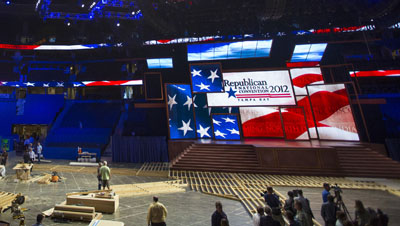With up to 15,000 journalists expected in Tampa, Fla., for next week’s Republican National Convention, some reporters and photographers will undoubtedly encounter problems concerning access to news events and coverage of related protests. Several journalism organizations have compiled resource materials and tips for journalists headed to the GOP gathering, which starts August 27, and the Democratic convention that begins September 3. Here are some of those resources:
- The Reporters Committee for Freedom of the Press, which has provided valuable advice to U.S. reporters for many years, will operate special convention hotlines for journalists who need legal assistance. The committee is launching a mobile first-aid app this year. The group’s digital legal guide is also a very useful primer.
- John Ensslin, president of the Society of Professional Journalists, offers tips for those covering the conventions. SPJ, which devotes a section to convention coverage on its tool box page, also operates a legal defense fund for journalists detained while covering a story.
- Mickey H. Osterreicher, general counsel for the National Press Photographers Association, provides useful advice on the CPJ Journalist Security Blog about your rights to photograph news events and what to do if you are detained by police. CPJ’s Journalist Security Guide offers broad guidance on covering protests and your (limited) rights to cover news on private property.
- The National Press Photographers Association provides its own resource center with guidance on the rights of photographers and links to resources and support organizations.
- The International News Safety Institute will host a free webinar on Thursday, August 23, at 8 p.m. EDT on safety, security, and rights for reporters and citizen journalists covering the conventions.
- The Investigative Reporters and Editors has compiled tipsheets on how to cover specific stories, including the campaign and elections. (Note that you must be a member to download the tip sheets.)
Conventions and accompanying events and protests often breed tension between police and the press. In 2008, during the Democratic National Convention, Denver police arrested an ABC News producer as his crew was waiting outside a hotel to film politicians attending a donor event. The same year, police in St. Paul, Minn., arrested dozens of journalists attempting to document protests related to the Republican National Convention. Those arrested in St. Paul included an AP photographer and three journalists from the nationally syndicated radio program “Democracy Now.” Although charges are often dropped in these types of cases, as they were in 2008, the detentions disrupt coverage and cause anxiety for journalists.
In the CPJ Journalist Security Blog, Osterreicher wrote about photographing news events, often a source of tension between journalists and police:
The right to observe and record police officers performing their duties in a public place is a recognized form of free speech through which the press and the public may gather and disseminate information on matters of public concern. First Amendment protections regarding such activity, while not absolute, may only be limited by reasonable time, place, and manner, or TPM, restrictions …
But the “reasonableness” of a TPM restriction is often in the eyes of the beholder. Police issuing an order to disperse may expect everyone including those with cameras to leave the area while journalists may believe that moving back or out of the way constitutes compliance.
If you do find yourself the subject of police attention, Osterreicher has some further advice:
If a police officer orders you to move, it is advisable to comply with the request. How far you move is something that you will have to decide for yourself. If you believe that the order is not a reasonable one, ask to speak to a supervisor or the public information officer (PIO) if that is possible. It is important to be aware that most police officers do not like to be questioned or challenged once they have told you to do–or not do–something and a mere hesitation, question, or request may result in your detention or arrest. Only you can make that judgment call as to what to do.
If you are questioned or detained, remember to remain calm and act professionally. Do not get into an argument about your rights. If you are able to have a reasonable discussion that is one thing but if it becomes apparent that the officer is not interested in your point of view it is usually best to move on. Discretion is the better part of valor.
